気になるので、WHOの臓器移植新指針のこと、検索して調べてみました。
この新指針の正式な名称は、「WHO GUIDING PRINCIPLES ON HUMAN CELL, TISSUE AND ORGAN TRANSPLANTATION」というらしいです。
以下、新指針の内容に対訳をつけ、原文を紹介します(→原文は≪社会学と生命倫理の迷い道≫というサイトに掲載してあったものです)。
ーーー
Guiding Principle (指針原則)1
Cells, tissues and organs may be removed from the bodies of deceased
細胞、組織、そして臓器は、移植のため死者の体から移してよい
persons for the purpose of transplantation if:
条件となるのは:
(a) any consent required by law is obtained, and
法によって求められている同意(consent )が得られていること
(b) there is no reason to believe that the deceased person objected to such removal.
死者がそのような移動に異議を唱えていたと信じるに足る理由がないこと
Guiding Principle 2
Physicians determining that a potential donor has died should not be
臓器提供者(ドナー)が死んだと判定する医師は、
directly involved in cell, tissue or organ removal from the donor or
提供される細胞や組織、臓器、または、引き続きある
subsequent transplantation procedures; nor should they be responsible for
移植手術に直接かかわってはならない;もしくは、細胞や組織、臓器を受け入れる
the care of any intended recipient of such cells, tissues and organs.
つもりでいる臓器受容者(レシピエント)の世話を引き受けている者であってはならない。
Guiding Principle 3
Donation from deceased persons should be developed to its maximum
死亡した人からの臓器提供は、治療の可能性の最大限を引き出さねばならない、
therapeutic potential, but adult living persons may donate organs as
しかし、生存する成人は、国内の法規制に則って臓器を提供する。
permitted by domestic regulations. In general living donors should be
一般的に生存する臓器提供者(ドナー)は、遺伝的に、法的に、あるいは
genetically, legally or emotionally related to their recipients.
情緒的に臓器受容者とつながっているべきである。
Live donations are acceptable when the donor’s informed and voluntary
生体の臓器の提供は、知るべきことを知らされた上、進んで同意したとき、
consent is obtained, when professional care of donors is ensured and
あるいは、臓器提供者の専門的な世話が保障され
follow-up is well organized, and when selection criteria for donors are
下支え(follow-up)する仕組みが組織され、そして臓器提供者の選考基準が
scrupulously applied and monitored. Live donors should be informed of the
細心の注意をもって用意され監視されるとき、受け入れられるのである。
probable risks, benefits and consequences of donation in a complete and
生きている臓器提供者は、発生しうるリスク、利益、生じる結果を完全に
understandable fashion; they should be legally competent and capable of
そして理解しうる形で教えられるべきである;彼らは、法律の素養があり、情報を
weighing the information; and they should be acting willingly, free of any
処理する能力に長けていなければならない;彼らは、意志的に行動すべきであり、
undue influence or coercion.
過度な影響や強制から免れていなければならない。
Guiding Principle 4
No cells, tissues or organs should be removed from the body of a living
現に生きている未成年者(minor)の体から取り出してよい細胞、組織、臓器は
minor for the purpose of transplantation other than narrow exceptions
国法によって認められた極めて例外的な場合を除き、存在しない。
allowed under national law. Specific measures should be in place to
未成年者を保護するため、特殊な物差しが用意されるべきであり、
protect the minor and, wherever possible the minor’s assent should be
臓器提供にあたって、可能である限り、未成年者の同意が求められるべきである。
obtained before donation. What is applicable to minors also applies to anylegally incompetent person.
未成年者に要求されるこの理は、法的に無能力とされる人にも当てはまる。
Guiding Principle 5
Cells, tissues and organs should only be donated freely, without any
細胞、組織、臓器は、いかなる財貨の支払いを伴うことなく、もしくは、
monetary payment or other reward of monetary value. Purchasing, or
経済的価値ある報償を伴わず、無償にて提供されるべきである。
offering to purchase, cells, tissues or organs for transplantation, or
細胞、組織、臓器の売買、もしくは、購入の申し出、または、生きている人自身による、
their sale by living persons or by the next of kin for deceased persons,should be banned.
もしくは、死者の近親者による販売は、禁じられるべきである。
The prohibition on sale or purchase of cells, tissues and organs does not
細胞、組織、臓器の販売、購入の禁止は、提供者(ドナー)が負うこととなった
preclude reimbursing reasonable and verifiable expenses incurred by the
穏当な、証明可能な細胞、組織、臓器を移植のため生じた所得の減少や、
donor, including loss of income, or paying the costs of recovering,
回復、加工、保存、提供のため支払った費用を含めて、出費の
processing, preserving and supplying human cells, tissues or organs for transplantation.
払い戻しを妨げるものではない。
Guiding Principle 6
Promotion of altruistic donation of human cells, tissues or organs by
細胞、組織、臓器の利他的な提供を奨励するのは
means of advertisement or public appeal may be undertaken in accordance with domestic regulation.
広告によって、公共的な要請によって国内法に規制され行われる。
Advertising the need for or availability of cells, tissues or organs, with
細胞、組織、臓器の入手の必要を訴える広告は、
a view to offering or seeking payment to individuals for their cells,
個人が提供する細胞、組織、臓器の対価を、個人に、もしくは、個人が死亡し
tissues or organs, or, to the next of kin, where the individual is
たところ、その近親者に申し出る、または、求める見地からのものは、
deceased, should be prohibited. Brokering that involves payment to such
禁じられるべきである。そのような個人、第三者への支払いを仲介する
individuals or to third parties should also be prohibited.
斡旋(あっせん)もまた禁止されるべきである。
Guiding Principle 7
Physicians and other health professionals should not engage in
医師やその他医療従事者は、移植の手術に関わってはいけない、
transplantation procedures, and health insurers and other payers should
そして健康保険業者、その他保険料支払人は、
not cover such procedures, if the cells, tissues or organs concerned have
そのような手術に応じてはならない、もし、関わる細胞、組織、臓器が
been obtained through exploitation or coercion of, or payment to, the
臓器提供者(ドナー)または近親者に対する搾取、強要、報酬を通じて手に入れた
donor or the next of kin of a deceased donor.
ものであるならば。
Guiding Principle 8
All health-care facilities and professionals involved in cell, tissue or
細胞、組織、臓器の調達、移植手術に関わる医療機関と医療従事者は
organ procurement and transplantation procedures should be prohibited from receiving any payment that exceeds the justifiable fee for the services rendered.
なしたサービスに対する適正な手数料を超える支払いを受けてはならない。
Guiding Principle 9
The allocation of organs, cells and tissues should be guided by clinical
臓器、細胞、組織の配分は、臨床的な選定すべきで、倫理規範に
criteria and ethical norms, not financial or other considerations.
導かれるべきものであって、断じて経済その他の事情を酌みすべきでない。
Allocation rules, defined by appropriately constituted committees, should
配分のルールは、適切に設営された委員会によって明確化され、
be equitable, externally justified, and transparent.
公平で、外部から見て正当性を有し、透明性がなければならない。
Guiding Principle 10
High-quality, safe and efficacious procedures are essential for donors and
高品質、安全と有効な手術は、臓器提供者(ドナー)と臓器受容者(レシピエント)
recipients alike. The long-term outcomes of cell, tissue and organ
にとり、同じように大切なことである。細胞、組織、臓器の提供と移植の
donation and transplantation should be assessed for the living donor as
長い期間に及ぶ成果は、臓器受容者におけると同様、臓器提供者においても
well as the recipient in order to document benefit and harm.
利するところ、害するところを記録するため査定されなければならない。
The level of safety, efficacy and quality of human cells, tissues and
安全性、有効性の程度、移植のための細胞、組織、臓器の質が
organs for transplantation, as health products of an exceptional nature,
まれな自然の健康の産物として
must be maintained and optimized on an ongoing basis. This requires
維持され、築かれる基礎とすべく高度に活用されねばならない。これは、
implementation of quality systems including traceability and vigilance,
with adverse events and reactions reported, both nationally and for
報告された不都合な出来事や反応を追跡する可能性と、警戒を含んだ品質管理システムが求められているということである、
exported human products.
国家間にまたがった、輸出した人間の部品(human products)について。
Guiding Principle 11
The organization and execution of donation and transplantation activities,
組織化と臓器提供と移植活動の実施は、
as well as their clinical results, must be transparent and open to
彼らの臨床的な結果と同じように、透明性を維持し、綿密に調査したことを
scrutiny, while ensuring that the personal anonymity and privacy of donors
開示するようにすべきである、匿名性を確保し、
and recipients are always protected.
臓器提供者と臓器受容者のプライバシーを常に保護しながらであるが。
以上、11の原則が臓器移植新指針として提示されたものです。上にリンクさせたサイトに要領よくまとめられてあるので、見られたらよいと思います。
この新指針の正式な名称は、「WHO GUIDING PRINCIPLES ON HUMAN CELL, TISSUE AND ORGAN TRANSPLANTATION」というらしいです。
以下、新指針の内容に対訳をつけ、原文を紹介します(→原文は≪社会学と生命倫理の迷い道≫というサイトに掲載してあったものです)。
ーーー
Guiding Principle (指針原則)1
Cells, tissues and organs may be removed from the bodies of deceased
細胞、組織、そして臓器は、移植のため死者の体から移してよい
persons for the purpose of transplantation if:
条件となるのは:
(a) any consent required by law is obtained, and
法によって求められている同意(consent )が得られていること
(b) there is no reason to believe that the deceased person objected to such removal.
死者がそのような移動に異議を唱えていたと信じるに足る理由がないこと
Guiding Principle 2
Physicians determining that a potential donor has died should not be
臓器提供者(ドナー)が死んだと判定する医師は、
directly involved in cell, tissue or organ removal from the donor or
提供される細胞や組織、臓器、または、引き続きある
subsequent transplantation procedures; nor should they be responsible for
移植手術に直接かかわってはならない;もしくは、細胞や組織、臓器を受け入れる
the care of any intended recipient of such cells, tissues and organs.
つもりでいる臓器受容者(レシピエント)の世話を引き受けている者であってはならない。
Guiding Principle 3
Donation from deceased persons should be developed to its maximum
死亡した人からの臓器提供は、治療の可能性の最大限を引き出さねばならない、
therapeutic potential, but adult living persons may donate organs as
しかし、生存する成人は、国内の法規制に則って臓器を提供する。
permitted by domestic regulations. In general living donors should be
一般的に生存する臓器提供者(ドナー)は、遺伝的に、法的に、あるいは
genetically, legally or emotionally related to their recipients.
情緒的に臓器受容者とつながっているべきである。
Live donations are acceptable when the donor’s informed and voluntary
生体の臓器の提供は、知るべきことを知らされた上、進んで同意したとき、
consent is obtained, when professional care of donors is ensured and
あるいは、臓器提供者の専門的な世話が保障され
follow-up is well organized, and when selection criteria for donors are
下支え(follow-up)する仕組みが組織され、そして臓器提供者の選考基準が
scrupulously applied and monitored. Live donors should be informed of the
細心の注意をもって用意され監視されるとき、受け入れられるのである。
probable risks, benefits and consequences of donation in a complete and
生きている臓器提供者は、発生しうるリスク、利益、生じる結果を完全に
understandable fashion; they should be legally competent and capable of
そして理解しうる形で教えられるべきである;彼らは、法律の素養があり、情報を
weighing the information; and they should be acting willingly, free of any
処理する能力に長けていなければならない;彼らは、意志的に行動すべきであり、
undue influence or coercion.
過度な影響や強制から免れていなければならない。
Guiding Principle 4
No cells, tissues or organs should be removed from the body of a living
現に生きている未成年者(minor)の体から取り出してよい細胞、組織、臓器は
minor for the purpose of transplantation other than narrow exceptions
国法によって認められた極めて例外的な場合を除き、存在しない。
allowed under national law. Specific measures should be in place to
未成年者を保護するため、特殊な物差しが用意されるべきであり、
protect the minor and, wherever possible the minor’s assent should be
臓器提供にあたって、可能である限り、未成年者の同意が求められるべきである。
obtained before donation. What is applicable to minors also applies to anylegally incompetent person.
未成年者に要求されるこの理は、法的に無能力とされる人にも当てはまる。
Guiding Principle 5
Cells, tissues and organs should only be donated freely, without any
細胞、組織、臓器は、いかなる財貨の支払いを伴うことなく、もしくは、
monetary payment or other reward of monetary value. Purchasing, or
経済的価値ある報償を伴わず、無償にて提供されるべきである。
offering to purchase, cells, tissues or organs for transplantation, or
細胞、組織、臓器の売買、もしくは、購入の申し出、または、生きている人自身による、
their sale by living persons or by the next of kin for deceased persons,should be banned.
もしくは、死者の近親者による販売は、禁じられるべきである。
The prohibition on sale or purchase of cells, tissues and organs does not
細胞、組織、臓器の販売、購入の禁止は、提供者(ドナー)が負うこととなった
preclude reimbursing reasonable and verifiable expenses incurred by the
穏当な、証明可能な細胞、組織、臓器を移植のため生じた所得の減少や、
donor, including loss of income, or paying the costs of recovering,
回復、加工、保存、提供のため支払った費用を含めて、出費の
processing, preserving and supplying human cells, tissues or organs for transplantation.
払い戻しを妨げるものではない。
Guiding Principle 6
Promotion of altruistic donation of human cells, tissues or organs by
細胞、組織、臓器の利他的な提供を奨励するのは
means of advertisement or public appeal may be undertaken in accordance with domestic regulation.
広告によって、公共的な要請によって国内法に規制され行われる。
Advertising the need for or availability of cells, tissues or organs, with
細胞、組織、臓器の入手の必要を訴える広告は、
a view to offering or seeking payment to individuals for their cells,
個人が提供する細胞、組織、臓器の対価を、個人に、もしくは、個人が死亡し
tissues or organs, or, to the next of kin, where the individual is
たところ、その近親者に申し出る、または、求める見地からのものは、
deceased, should be prohibited. Brokering that involves payment to such
禁じられるべきである。そのような個人、第三者への支払いを仲介する
individuals or to third parties should also be prohibited.
斡旋(あっせん)もまた禁止されるべきである。
Guiding Principle 7
Physicians and other health professionals should not engage in
医師やその他医療従事者は、移植の手術に関わってはいけない、
transplantation procedures, and health insurers and other payers should
そして健康保険業者、その他保険料支払人は、
not cover such procedures, if the cells, tissues or organs concerned have
そのような手術に応じてはならない、もし、関わる細胞、組織、臓器が
been obtained through exploitation or coercion of, or payment to, the
臓器提供者(ドナー)または近親者に対する搾取、強要、報酬を通じて手に入れた
donor or the next of kin of a deceased donor.
ものであるならば。
Guiding Principle 8
All health-care facilities and professionals involved in cell, tissue or
細胞、組織、臓器の調達、移植手術に関わる医療機関と医療従事者は
organ procurement and transplantation procedures should be prohibited from receiving any payment that exceeds the justifiable fee for the services rendered.
なしたサービスに対する適正な手数料を超える支払いを受けてはならない。
Guiding Principle 9
The allocation of organs, cells and tissues should be guided by clinical
臓器、細胞、組織の配分は、臨床的な選定すべきで、倫理規範に
criteria and ethical norms, not financial or other considerations.
導かれるべきものであって、断じて経済その他の事情を酌みすべきでない。
Allocation rules, defined by appropriately constituted committees, should
配分のルールは、適切に設営された委員会によって明確化され、
be equitable, externally justified, and transparent.
公平で、外部から見て正当性を有し、透明性がなければならない。
Guiding Principle 10
High-quality, safe and efficacious procedures are essential for donors and
高品質、安全と有効な手術は、臓器提供者(ドナー)と臓器受容者(レシピエント)
recipients alike. The long-term outcomes of cell, tissue and organ
にとり、同じように大切なことである。細胞、組織、臓器の提供と移植の
donation and transplantation should be assessed for the living donor as
長い期間に及ぶ成果は、臓器受容者におけると同様、臓器提供者においても
well as the recipient in order to document benefit and harm.
利するところ、害するところを記録するため査定されなければならない。
The level of safety, efficacy and quality of human cells, tissues and
安全性、有効性の程度、移植のための細胞、組織、臓器の質が
organs for transplantation, as health products of an exceptional nature,
まれな自然の健康の産物として
must be maintained and optimized on an ongoing basis. This requires
維持され、築かれる基礎とすべく高度に活用されねばならない。これは、
implementation of quality systems including traceability and vigilance,
with adverse events and reactions reported, both nationally and for
報告された不都合な出来事や反応を追跡する可能性と、警戒を含んだ品質管理システムが求められているということである、
exported human products.
国家間にまたがった、輸出した人間の部品(human products)について。
Guiding Principle 11
The organization and execution of donation and transplantation activities,
組織化と臓器提供と移植活動の実施は、
as well as their clinical results, must be transparent and open to
彼らの臨床的な結果と同じように、透明性を維持し、綿密に調査したことを
scrutiny, while ensuring that the personal anonymity and privacy of donors
開示するようにすべきである、匿名性を確保し、
and recipients are always protected.
臓器提供者と臓器受容者のプライバシーを常に保護しながらであるが。
以上、11の原則が臓器移植新指針として提示されたものです。上にリンクさせたサイトに要領よくまとめられてあるので、見られたらよいと思います。










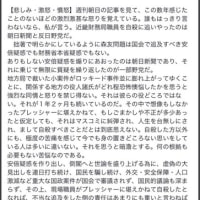
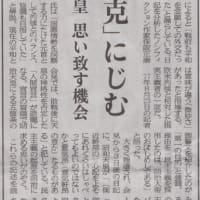
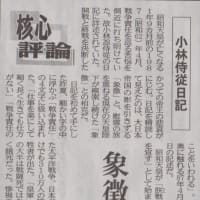
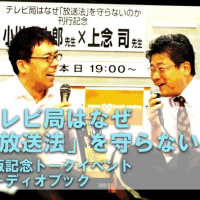
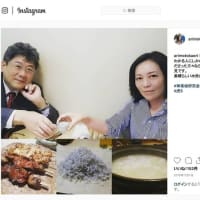
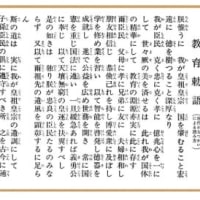



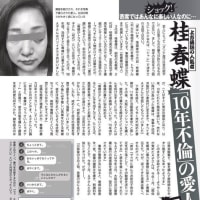
※コメント投稿者のブログIDはブログ作成者のみに通知されます